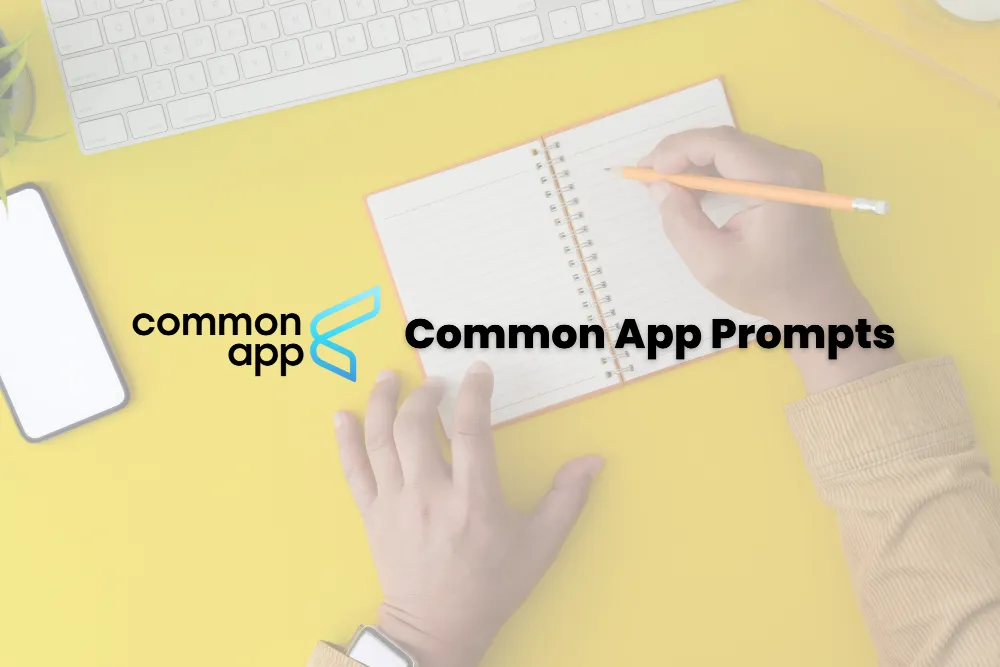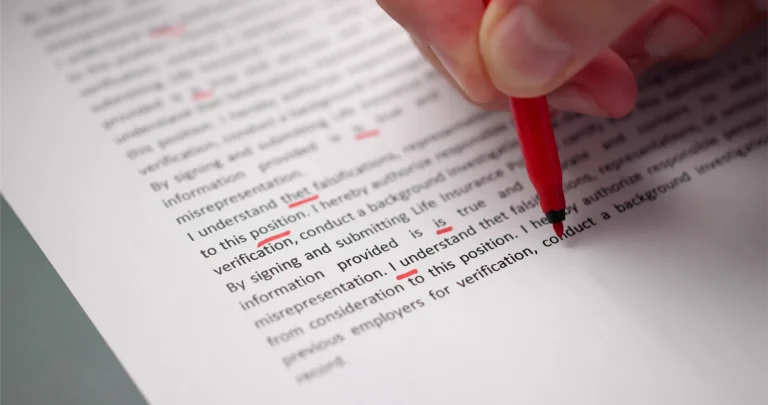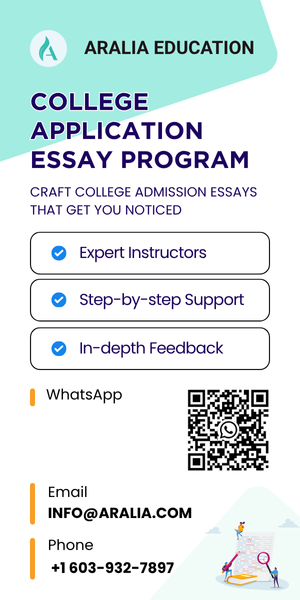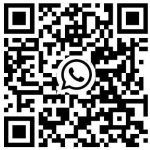If you are looking for a general common app prompt guide regardless of the prompt, check out 4 Steps to Write Common Application Essays 2022-2023 (With Examples). In this article, we will jump straight into providing a guide on choosing the right prompt and how to write the essay for each one. In the end, you will be able to craft a meaningful and impactful response that will impress the next admission officer. Now, let’s dive right in!
PROMPT 1: Some students have a background, identity, interest, or talent that is so meaningful they believe their application would be incomplete without it. If this sounds like you, then please share your story.
- What is this prompt asking?
Background, identity, interest, talent, and meaning are the main 5 keywords you should use to brainstorm for. This prompt gives you the opportunity to discuss your background, your upbringing, and your personal interests that are worth highlighting to the admission officer. These don’t have to be unique, but they should tightly relate to your overall development, life philosophy, and your passions.
- How can I brainstorm for this prompt?
We will dive deeper into each keyword mentioned in the prompt to give you guidance for brainstorming. Overall, the strategy here is to make sure your background and interests are unique to you, who you are perceived as in society, and how you have influenced and shaped your behavior and decisions.
Background: Where do you come from? What are your roots? How were you raised? Compare this to the upbringing of your friends or classmates. How is your background different? How did it impact you in a meaningful way? How is it impacting you today (in the way you live, do things, and react to things)? How will it impact your future?
The general strategy for the background is to think from small to big, from what your true inner self is to the environment you are living in.
Identity: Identity is a little bit different from background, because identity is what you identify as and relate yourself to. You can identify yourself with a specific community (culture, gender, race, sex, religion, etc.) and discuss how this reflects your growth.
Interest and Talents: Both are quite similar, because both discuss what you are interested in. If you decide to write about interests and talents, you should make sure that they are unique compared to other interests/activities you have done. For example, if you are applying as a football player in your college application and you have a burning passion for art and design, you can write about art and design in this section. This can directly link to how you have grown as a person.
PROMPT 2: The lessons we take from obstacles we encounter can be fundamental to later success. Recount a time when you faced a challenge, setback, or failure. How did it affect you, and what did you learn from the experience?
- What is this prompt asking?
Challenge, setback, failure, success are the four keywords for this prompt. The point of this prompt is that you have to find a challenge that is relevant to what you are doing and what you aspire to be. This challenge is the foundation for your success in the future. In this prompt, the admission officer is looking for a student’s discovery of vulnerability and maturity.
- How can I brainstorm for this prompt?
In this prompt, you should think about the challenges you have faced in your life. Think beyond academics, school, and your GPA, but consider more about a personal challenge that has shaped your view of the world or your behavior. Regardless of the challenge, you should explain your thought process and development to highlight how your thinking was before and after encountering the issue. Admission officers appreciate a student’s ability to be resilient, never to give up and, to understand the lessons they learned from the issue.
Examples of challenges can be: your family moved to new cities constantly every 2 years so you don’t have the chance to develop a strong relationship with friends, or the challenge to fit in because you just moved to a new country all by yourself, or the challenge to have a normal life despite having a critical health condition, or the fight against your family’s expectation to marry at the age of 18 instead of going to college.
- What is an example of this prompt?
Lessons from Failure Essay – “Piano” by an Anonymous Student
PROMPT 3: Reflect on a time when you questioned or challenged a belief or idea. What prompted your thinking? What was the outcome?
- What is this prompt asking?
Question, challenge, belief, and idea are the four main keywords in this prompt. For this prompt, you should discuss the conflicts you have had or the pushback you experienced from a higher authority in standing up for and supporting what you believe in. Beliefs can be personal or religious ones, while ideas can range from anything as small as ideas for the school to as big as ideas for society.
- How can I brainstorm for this prompt?
Some questions you can think about when brainstorming for this prompt are: What do you believe in? What is important to you? Why did you have those beliefs and ideas? What was the outcome of your ideas? Remember to focus on describing the process and the result, and what have you learned along the way.
Thinking about challenging a belief or idea, we immediately connect them to leadership personalities. Leaders are great visionary and planners. However, not all leaders’ ideas will be agreed upon by team members and stakeholders. Therefore, we will brainstorm ideas for this prompt based on the challenges leaders normally face.
You can challenge the status quo and desire for an innovative change through creation. An example of the status quo can be: There are a lot of vacant parking lots that are underutilized and under-monetized by their owners, while there are parking lots that cost up to $50/hour in some urban areas. You can challenge this ideology by developing an app to advertise vacant parking spaces for space owners, so people can come to the app and search for available spots.
You can also fight for a change through activism. If you are interested in human rights, environmental rights or any other rights, you can also specify what have you done in support of your beliefs, and how you have had setbacks by multiple forces.
You can fight for a change through personal transformation. An example can be how an LGBTQ student finds confidence and self-love in a society where people don’t accept you for who you are and sometimes you feel like an outcast compared to other people. Another example can be how a woman of color decides to enter a male-dominated field like manufacturing due to her love of cars.
- What is an example of this prompt?
An essay from students being admitted to the Ivy League, posted by CollegeVine.
PROMPT 4: Reflect on something that someone has done for you that has made you happy or thankful in a surprising way. How has this gratitude affected or motivated you? (NEW)
- What is this prompt asking?
Gratitude and motivation are the main keywords for this prompt. In responding to the pandemic, Common App has introduced this prompt to help students express gratitude. This prompt is significantly different because while other prompts ask for what the students they have done, this prompt asks for what other people have done for the student. Though this prompt was inspired due to the pandemic, students can reflect on the feeling of gratitude during any time period in their lives, and how gratitude motivates and inspires them to be better.
You should think about times when you have felt acknowledged, heard, and seen. Moments when you have felt that swelling in their chest, as your heart seems like it grows three sizes. Think creatively about what you appreciate in your life. It can be a physical gift, an action, or even just a set of feelings projected in your direction. You can be intimately familiar with the person who has inspired your gratitude or reflect on the actions of a near stranger or even a public figure who has impacted your life for the better. Just remember this essay needs to focus on how you process, appreciate and draw inspiration from the actions of others, so make sure your response is focused on YOU. Ultimately, admissions officers want to know more about how you relate to others in the world, and how you repurpose good intentions.
- How can I brainstorm for this prompt?
Despite being a simple question, this question allows you to dive deeper into who you are and what you are grateful for. There are two parts to this prompt: “something that someone has done for you that has made you happy or thankful in a surprising way” and “how has this gratitude affected or motivated you?”
For the first part, you should pay close attention to the phrase “surprising way”. Take some time to think about something someone has done for you that you didn’t expect. “Something” doesn’t have to be a major life-changing event, but it has to be unexpected. “Someone” in this case is a living figure, someone who is close to you or someone who knows you, instead of historical figures. Some examples of something someone has done for you can be: a friend who went out of his way to help expand the club you’re leading, or a community that helped you get your first internship. While brainstorming for the event, you should ask yourself “If I told this story to a stranger, would they be surprised?”
The first part is the bridge to the most important part of your essay, “how has this affected or motivated you?” You should first discuss and explain the situation, then describe why this is important to you and how this has affected you. Even though the prompt is about what someone has done for you, you should focus the discussion on your reflection. Specifically, you should talk about how you acknowledge the help, express gratitude and channel your gratitude to help other people. Ultimately, the admission officer wants to know more about you, how you react to gratitude, and how you act after receiving such help.
Some questions to help you with the brainstorming process:
Something that someone has done for you that has made you happy or thankful in a surprising way
- What challenges have you faced in the past where you couldn’t figure out a solution?
- How did the person/community/people help you solve the challenge?
- What was the achievement you are most proud of so far? Who has helped you on the way to achieving that goal?
- If you could change anything about the world, what would it be? How might you change it? Who would you ask for help? (Questions suggested by Transizion)
How has this gratitude affected or motivated you?
- How do you want to pay it forward in the future once you’re settled down?
- If you can only do one thing for the rest of your life, what would you want to do?
- What current issue do you care about the most?
- How do you normally give back to people/community?
Since this prompt was just released this year, we currently don’t have writing samples. If you want to read a more detailed guide on the prompt, ThoughtCo has analyzed this prompt.
PROMPT 5: Discuss an accomplishment, event, or realization that sparked a period of personal growth and a new understanding of yourself or others.
- What is this prompt asking?
Accomplishment, events, realization, personal growth and understanding are the main keywords for this prompt. While accomplishments are positive achievements like earning an award, events and realizations can be open to further interpretation. The main point of this prompt focuses on your personal growth and understanding of yourself or others. Therefore, accomplishments, events or realizations will be the transition into expressing and reflecting your personal change.
- How can I brainstorm for this prompt?
There are two ways you can brainstorm for this prompt: describe a small event or a big event. While students think that small events can be more impactful and meaningful than big events; however, if you add enough detail and unique viewpoints on the topic, the size of the event does not matter as much.
Small and informal events give students space to express their personalities. An example can be learning to make fried rice through a recipe, a realization that life and creation don’t follow any recipe. A sample essay discussing this example is available below.
Big events give students opportunities to provide more significant reflection and personal growth, leading to a better understanding of themselves and others. An example of a big event is the author watching their visually impaired grandmother misstep, thus leading to the author’s understanding of people with different needs and wants. We also link to this example essay below.
Regardless of the events, the key to this prompt is to discover your growth throughout the years, then describe the root for this growth and reflect on your process from that time on. Another critical part students should remember is that the whole story does not have to be in the past, as the growth can continue if you are still improving today.
Some questions that can help you better brainstorm for this prompt is:
- What events/moments have changed you as a person? How did you know that those have changed you?
- Did you learn something new that made you feel more grown-up?
PROMPT 6: Describe a topic, idea, or concept you find so engaging that it makes you lose track of time. Why does it captivate you? What or who do you turn to when you want to learn more?
- What is this prompt asking?
Compared to other prompts, this prompt focuses more on your professional pursuits and your passions on top of your personal growth. In this prompt, the admission committee wants to understand what intrigues you, how you develop from inspiration and how you seek out information to satisfy your curiosity.
- How can I brainstorm for this prompt?
To get started with the brainstorming, there are several questions you can ask yourself:
- What do you think about waking up in the morning?
- What do you love doing? Why does this excite you?
- If you find interest in a topic, how did you learn more/dive deeper into it?
- If you can only do one job for the rest of your life, what would it be?
After answering these questions, you will find one or two things you are passionate about. An example could be the wilderness exploration you did with your parents when you were young. Next, you can expand the topic into discovering your love for the environment and appreciation for nature. The key to answering this question is to openly express your love for a topic and explain in detail the why and how. This is like a narrative essay, where you can describe your interest by leveraging sensory details. While brainstorming, remember to use the why, what, how, when, where to dig deeper into your topic of interest. You can use a mind map to branch out your thinking process and choose what direction you want your essay to go.
- What is an example of this prompt?
Renner Kwittken ’23 – Tufts University
PROMPT 7: Share an essay on any topic of your choice. It can be one you've already written, one that responds to a different prompt, or one of your own design.
- What is this prompt asking?
This prompt is actually one of the hardest prompts. Even though the sky’s the limit for this prompt, many students don’t actually know what’s special enough to include here. Students have the freedom to create their own prompt about any topic they prefer. Regardless of the topic they choose, the Common App essay is the best way for admissions committees to get to know you. Therefore, everything you write should trace back to telling your personal story, your personal growth, your passion and your potential.
- How can I brainstorm for this prompt
What is the most unique thing about you?
If there is only one thing you would be known for, what would it be?
What do you want the admission officer to know about you in addition to your academic performance?
These are some questions to help you get started with the brainstorming process. In the meantime, think about what topic, what direction you want to lead your essay to. If your content fits one of the six prompts, consider answering those questions instead of this. The most important aspect of this prompt is to write an unconventional essay that reflects you and you only. This is a high risk, high reward kind of prompt, because if you can nail it, you will stand out, or else you won’t leave a strong impression with the admission officer.
That’s everything we want to cover for this article! If you made it this far, congratulations! You now have a strong understanding of each prompt and how you can further develop ideas for your prompt of choice. Writing a personal statement is a long process that requires personal reflection and discovery. If you hit a mental block while writing a personal statement, take a break, get some fresh air, then come back strong with persuasive ideas. Good luck!











